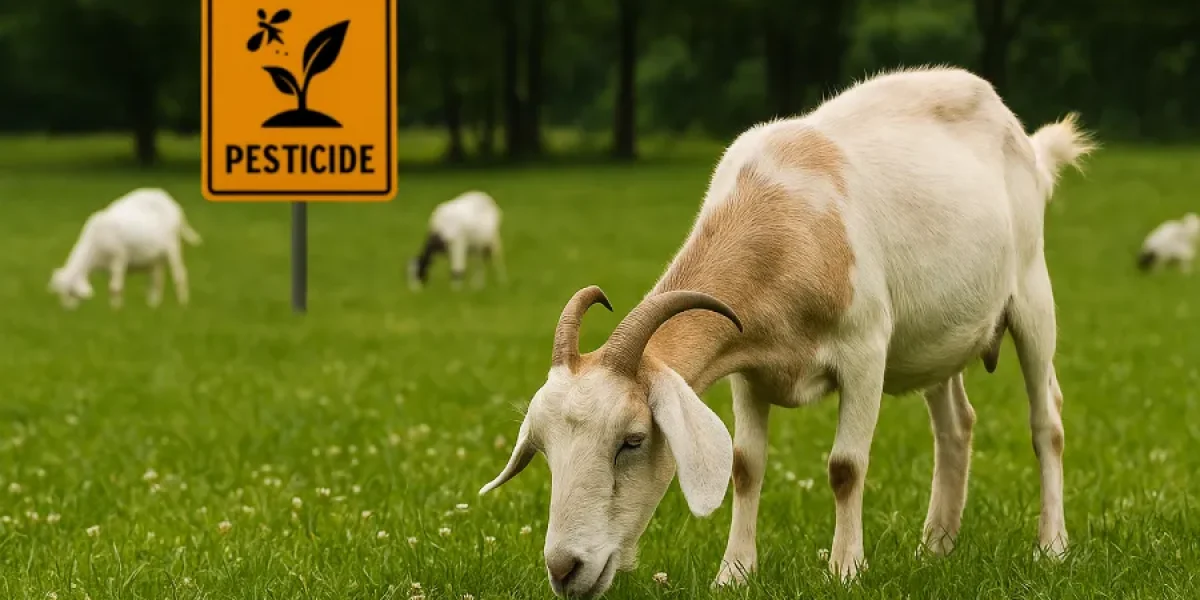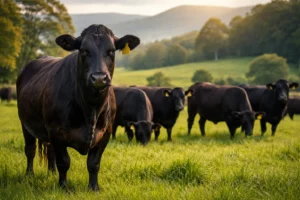If you’ve ever opened the gate to a fresh green pasture and noticed your goats develop runny stools a day later, you’re not alone. That’s when most of us learn that pasture management is about more than lush grass and good fencing — it’s about knowing what causes sudden diarrhea after pasture change in goats and how to prevent it.
When goats shift to new forage, their delicate rumen balance can be disrupted by natural, chemical, or biological factors. Some of these are easy to fix; others require better long-term management. In this post, I’ll walk you through the real causes of diarrhea after a pasture change, and what I’ve learned over years of keeping goats happy and healthy through every season.
Goat Diarrhea: A Wake-Up Call
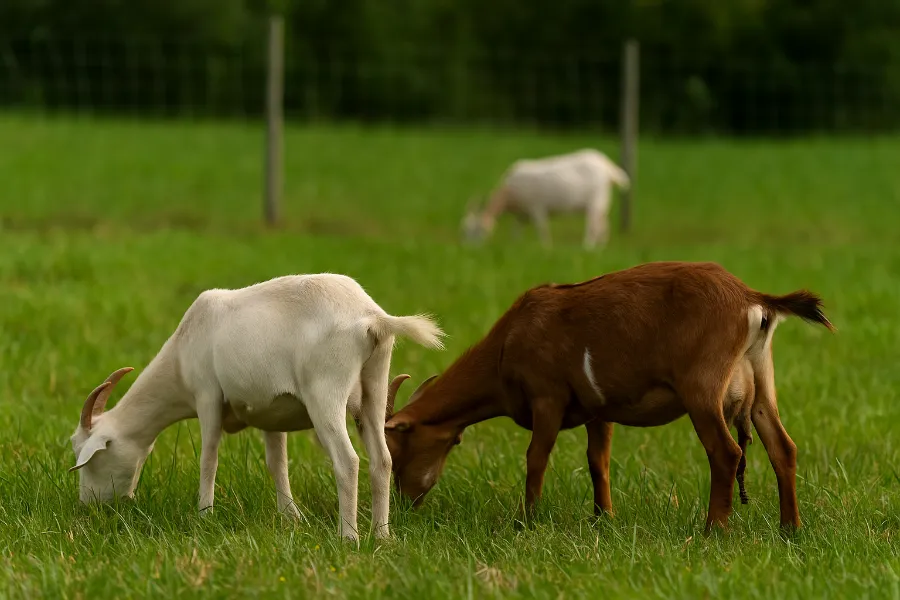
“Goat diarrhea” is something every herdsman deals with eventually. It’s not just a messy inconvenience — it’s a message from your herd that something inside isn’t right. After a pasture change, loose stool is often your first warning sign.
Why Pasture Change Causes Diarrhea
- When goats move from hay or older forage to lush, green grass, the rumen microbes that digest their food aren’t prepared for the change.
- Fresh grass has more water, sugars, and proteins but less fiber. That combination leads to rapid fermentation, gas, and acidity.
- Add dew, rain-soaked plants, or overgrazing close to the soil, and you amplify the stress on their digestive system.
Sudden diarrhea after a pasture change is your goat’s way of saying: “Too much, too soon.”
Goat Feeding: Smart Forage Transitions
Over the years, I’ve learned that goat feeding routines make or break the transition between pastures. It’s not enough to have good grass — the feeding strategy around it matters even more.
My Feeding Rules for Pasture Changes
- Feed hay before turnout.
Let goats fill up on dry hay before grazing. This helps buffer the rumen and prevents overeating new grass. - Increase pasture time gradually.
Day 1: one hour. Day 2: two hours. Over the course of a week, let them graze longer until their digestion adjusts. - Provide minerals and baking soda free-choice.
Goats are excellent at self-regulation when they have access to the right minerals and rumen buffers. - Avoid grain during transitions.
Lush pasture and grain together overwhelm the rumen microbes and cause scours. - Watch moisture levels.
Morning dew and freshly irrigated pastures add extra water intake. Wait until the grass is dry before grazing.
With careful feeding, you can avoid most cases of post-pasture diarrhea. The goal is to keep the rumen environment as stable as possible.
Deworming Goats: Biological Hazards in Pasture Rotation
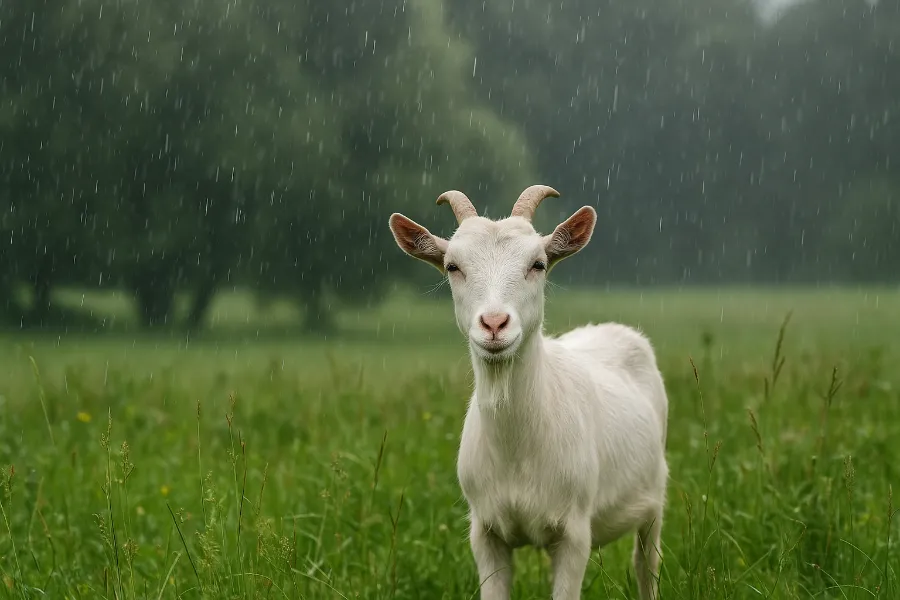
One of the biggest biological causes of diarrhea after a pasture change is parasites. When goats graze close to the ground, they ingest parasite larvae or eggs — and fresh, damp pasture conditions make it worse.
The Pasture-Parasite Connection
- Parasite eggs hatch and climb up grass blades when humidity and temperature rise.
- Goats moving to new fields might encounter contaminated patches if the area wasn’t properly rested.
- Stress from relocation lowers their immune response, allowing parasites to multiply faster.
My Deworming Goats Routine
- Fecal testing: Before major pasture changes, I test fecal samples to track worm loads instead of relying on guesswork.
- Rotational grazing: I give each paddock at least 60 days of rest before bringing goats back. This breaks most parasite life cycles.
- Multi-species rotation: When possible, I graze chickens or cows afterward to disrupt parasite habitats.
- Targeted treatment: I only deworm individuals who need it, not the whole herd every time.
Good pasture management and careful timing make deworming more effective and help prevent scours caused by parasite stress.
Natural Dewormers for Goats: A Holistic Option
If you prefer a natural route, you’ll be glad to know there are effective natural dewormers for goats that fit well into a pasture-based system. They won’t replace modern medicine when worm loads are high, but they can help keep things under control naturally.
My Favorite Natural Dewormers
- Garlic: Crushed or powdered garlic in small doses supports the immune system and discourages parasites.
- Pumpkin seeds: Contain compounds that paralyze intestinal worms, making them easier to expel.
- Diatomaceous earth (food-grade): May help dry out and damage parasite exteriors when mixed with feed.
- Wormwood and mugwort: Strong antiparasitic herbs; use with care and not for pregnant goats.
- Black walnut hulls: Potent but should only be used occasionally and under vet advice.
How I Use Them
Before introducing goats to new pasture, I often give a mix of garlic and pumpkin seed in their feed. Two weeks later, I’ll repeat and check fecal samples to confirm results. For me, these natural tools complement good management — they aren’t a cure-all, but they help maintain balance.
Chemical Hazards in Pasture Management
When it comes to pasture management, chemicals are an invisible threat that can quickly upset goat digestion. Even when a field looks perfect, residues or toxins can linger.
Nitrate and Nitrite Toxicity
Grasses like sorghum, oats, or Sudan grass can store nitrates after drought or heavy fertilizer use. When goats eat them, nitrates convert to nitrites, blocking oxygen in the bloodstream. Diarrhea, weakness, and dark-colored gums are common signs.
Prevention: Avoid grazing freshly fertilized or drought-stressed fields, and test forage if you’re unsure.
Herbicide and Pesticide Residue
Recently treated pastures may look fine but still contain trace chemicals that irritate the gut. Always follow the product’s withdrawal period before allowing goats to graze.
Mycotoxins and Mold
Moldy hay or old feed can harbor fungi that produce toxins. Ingesting even small amounts leads to chronic scours or reduced feed intake. Keep feed storage dry, clean, and well-ventilated, and clear away spoiled forage before grazing.
Biological and Environmental Hazards
Aside from parasites and chemicals, several natural conditions also contribute to digestive upset during pasture changes.
Bacterial Imbalance
When goats overeat lush grass, certain bacteria like Clostridium perfringens can multiply too fast, causing enterotoxemia (overeating disease). Annual CD&T vaccinations protect against this, but slow dietary change is still the best prevention.
Water Quality
Goats may drink from puddles, ditches, or ponds when exploring new fields. Contaminated water with high sulfur or algae can lead to diarrhea or mineral imbalance. I always provide clean water in troughs and add apple cider vinegar to help regulate pH.
Stress
Never underestimate the effect of stress. Moving to a new area changes herd hierarchy, scents, and surroundings — all of which can disrupt digestion. I keep transitions calm, maintain feeding schedules, and make sure they have shade and shelter ready in every new paddock.
Goat Feeding: Supporting Rumen Health During Pasture Changes
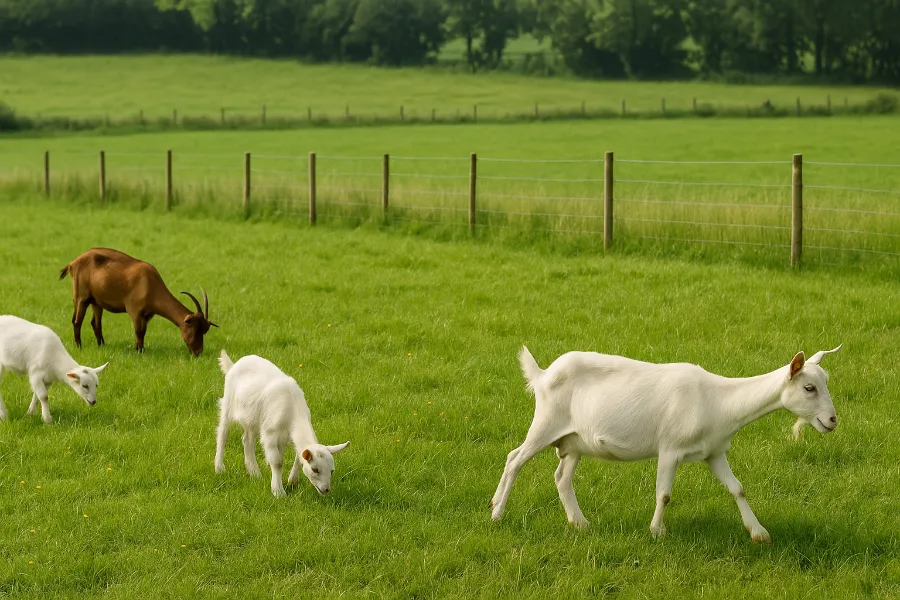
The rumen is the center of a goat’s health, and everything in pasture management ties back to it. I’ve learned to treat rumen health as the real measure of success, not just shiny coats or high milk yield.
My Routine for Rumen Support
- Feed dry hay daily — even when pasture is abundant. It maintains fiber and keeps rumen bacteria balanced.
- Offer probiotics or live-culture yogurt after pasture changes to repopulate good microbes.
- Watch manure consistency. Pellet-shaped droppings mean good balance; clumps or wetness mean trouble.
- Keep salt and mineral licks fresh and covered to prevent moisture buildup.
- Avoid sudden grain feeding — especially if pasture is already rich in protein.
Healthy rumen = stable digestion = fewer pasture-change problems.
Toxic Plants: The Hidden Culprits
When goats explore new territory, they’re bound to taste things they shouldn’t. A new pasture may contain toxic plants that irritate the gut or worse.
Common offenders:
- Buttercups — cause mouth and gut irritation
- Bracken fern — toxic over time
- Nightshade — damages the nervous system
- Oak leaves and acorns — tannins cause black, tarry scours
- Wild cherry, lantana, or pokeweed — can cause poisoning in quantity
I walk every new pasture before releasing goats, especially after rain, since some weeds spread fast. Good fencing and frequent mowing help keep unwanted plants from taking over.
Water and Minerals: The Silent Digestive Regulators
Water quality often changes between pastures, and so does mineral composition. I once rotated goats into a low-lying area with well water high in sulfur — within two days, half the herd had soft stools. Lesson learned.
My Water Routine
- Refresh troughs daily and scrub weekly.
- Offer loose minerals, not blocks — goats lick less efficiently than cattle.
- Test well water or ponds at least twice a year for minerals and bacteria.
- Add electrolytes during hot or stressful days to prevent dehydration.
Small adjustments in water and mineral management make a big difference in digestion.
Environmental and Seasonal Factors
Even when forage and water are perfect, weather can turn everything upside down.
- Rain and humidity accelerate parasite growth and bacterial activity.
- Morning dew dilutes nutrition and increases moisture intake.
- Soil minerals vary between pastures — one might be high in magnesium, another low in copper — creating digestive imbalance.
- Flooded or muddy fields can cause goats to ingest dirt and bacteria that upset their gut.
Whenever possible, I wait for pastures to dry slightly before turnout, and I reseed fields with a mix of grasses for stability.
When Goat Diarrhea Strikes: My Quick Response Plan
Even with great management, goats sometimes surprise you. Here’s what I do the moment diarrhea appears after a pasture change:
- Isolate affected goats to prevent spread and observe them closely.
- Feed hay only for 24 hours — no green forage or grain.
- Provide clean water with electrolytes.
- Check eyelids (for anemia), temperature, and stool consistency.
- Offer probiotics to restore gut flora.
- Check for signs of parasites or toxins.
- Call a vet if symptoms persist longer than two days, if there’s blood in stool, or if the goat becomes weak or dehydrated.
Most mild scours resolve within 24–48 hours if caught early, but I never ignore them.
Pasture Management: Prevention Above All
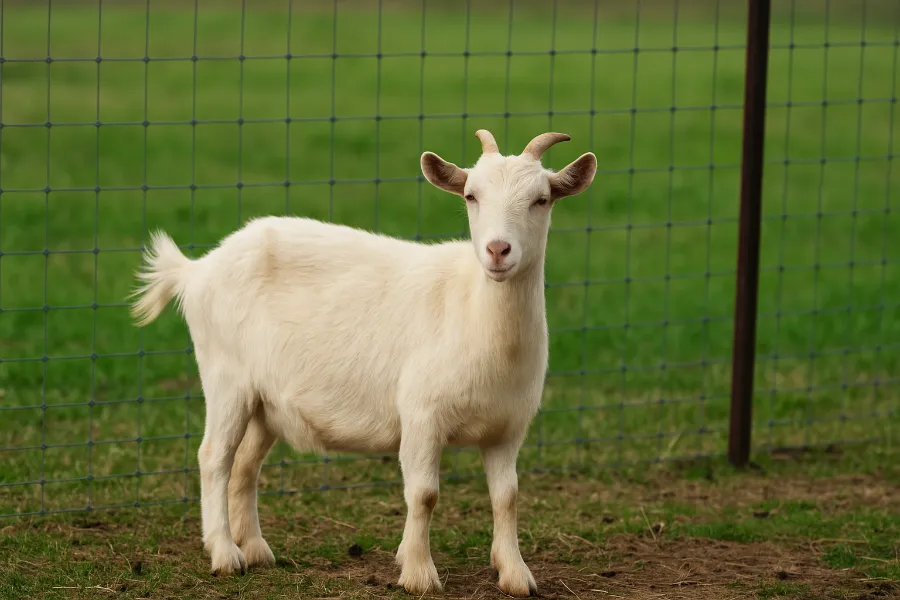
All these details come down to one thing — prevention. Pasture management isn’t just a grazing plan; it’s a health strategy. Every pasture rotation should protect both the soil and the goats that feed on it.
My Pasture Management Checklist
- Inspect each new field before grazing.
- Rotate pastures every 4–6 weeks.
- Rest paddocks at least 60 days between rotations.
- Mix grass species to avoid nutrient imbalance.
- Keep clean water and shade in every field.
- Use natural dewormers regularly and chemical ones strategically.
- Track grazing history and symptoms — patterns teach you everything.
A well-managed pasture keeps goats’ digestion stable, parasite pressure low, and overall health strong.
Final Thoughts
For me, understanding what causes sudden diarrhea after pasture change in goats was a turning point in how I approached my herd. It’s rarely just one cause — it’s a combination of diet shock, parasites, environment, and stress.
By improving pasture management, practicing gradual goat feeding transitions, applying smart deworming goats strategies, and relying on natural dewormers for goats whenever possible, I’ve turned my herd’s weak spots into strengths.
Now, when the grass turns greener, I don’t worry — I prepare. And that preparation makes all the difference between a stressed herd and a thriving one.
FAQs
Sudden diarrhea usually happens when goats move too quickly from dry feed to lush, green pasture. The rapid diet change shocks the rumen microbes and leads to digestive upset.
Introduce the new pasture gradually over several days and continue offering hay to balance moisture and fiber. Avoid grazing during heavy dew or right after rain.
Yes, parasites like barber pole worms or coccidia often thrive in damp pastures and can trigger scours. Regular fecal testing and strategic deworming help control outbreaks.
Feed dry hay before turnout and offer minerals and baking soda free-choice. Gradually extend grazing time each day to allow their rumen bacteria to adapt.
Natural options like garlic, pumpkin seeds, and food-grade diatomaceous earth can help reduce worm loads. They work best alongside good pasture rotation and fecal monitoring.
Yes. Nitrate-rich grasses, herbicide residues, or moldy feed can irritate the gut and cause diarrhea. Always check pastures for recent chemical use and avoid over-fertilized fields.
Call a vet if diarrhea lasts more than 48 hours, if the goat becomes weak, or if there’s blood or dehydration. Persistent scours can signal parasites, toxins, or infection that need treatment.

